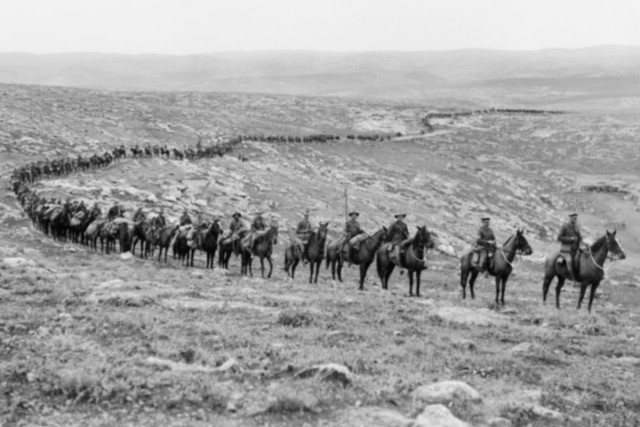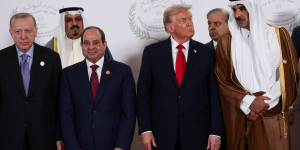The UN’s Palestinian statehood error

The United Nations, conceived as a forum for sovereign nations to resolve disputes and uphold a rules-based international order, is experiencing a critical failure of perception. It is succumbing to a mass hallucination, one that threatens to unravel the very fabric of post-Westphalian statehood and dishonor the heroic deeds of the heroes who forged the modern Middle East. At the heart of this delusion is the irresponsible recognition of a “State of Palestine.”
This is not a matter of diplomatic nuance; it is a fundamental error in fact and logic. As was rightly stated by US Secretary of State Marco Rubio, one cannot recognize something that does not exist. A state, under the most basic tenets of international law—principles the UN is supposed to uphold—requires a defined territory, a permanent population, a governing authority that exercises effective control, and the capacity to enter into relations with other states. The Palestinian Authority possesses none of these in a stable, uncontested, or sovereign manner. Its territory is split between several rival regimes, its borders are undefined and disputed, its governance is fractured, and its external relations are often those of a supplicant or a belligerent, not a co-equal sovereign.
This unilateral recognition is not just a procedural error; it is a profound historical insult. It is a direct repudiation of the immense sacrifice and strategic victory won by the very nations now being pressured to endorse this fiction: France, Britain, Australia, and Canada. To understand the depth of this betrayal, one must return to the crucible of the First World War and the defeat of the Ottoman Empire.
The Ottoman Empire was not a benign entity. It was a colonizing, imperial power that for centuries had subjugated the Arab peoples of the Middle East under its autocratic rule. Since the 13th century, it had been a vehicle for a pan-Islamic ideology, seeking to establish a regional autocratic Islamic Caliphate. This was not a democratic vision. It was a theocratic and political structure designed to extinguish any possibility of Arab self-determination and bind diverse peoples to the absolutist will of the Sultan in Constantinople.
The Allies of World War I—specifically the forces of Great Britain, France, Australia, and Canada—understood the stakes. They did not expend their blood and treasure into the sands of Palestine and the cliffs of Gallipoli merely to replace one empire with another. They fought to break a system of oppression and to create the conditions for freedom.
The provided historical text vividly recounts this pivotal struggle. The British Empire, with its formidable Indian Army, bore the brunt of the fighting, suffering humiliating setbacks at Kut before ultimately triumphing in Mesopotamia and, under the brilliant General Allenby, achieving a decisive victory in Palestine. The capture of Jerusalem was not just a military objective; it was a symbolic liberation from centuries of Ottoman control.
The Australian Light Horse Brigade’s legendary charge at Beersheba was a moment of unparalleled audacity and courage. It was not undertaken for mere territorial gain. It was to secure the vital water wells and break the Ottoman defensive line, a necessary step to pry the region from the Empire’s grip. The French fought tenaciously at Gallipoli and, crucially, led the victorious campaign on the Macedonian Front that shattered the Ottoman alliance and brought its armies to the brink of collapse. Even Canada’s contribution, though primarily on the Western Front, was indispensable in defeating Germany, the Ottoman Empire’s chief patron and supplier. The defeat of Germany meant the Ottomans were left isolated and doomed.
This collective effort—this symphony of Allied force—was what finally “threw off the yoke” of Ottoman rule. The victory was absolute. The empire was dismantled. And from its ashes, the victorious Allies did not simply annex the territory. Instead, they established the Mandate System through the League of Nations.
The Mandate System is willfully mischaracterized today by those who wish to paint the Allies as mere colonizers. This is a gross distortion. The stated, legal purpose of the Mandate System was to provide tutelage and administration for peoples “not yet able to stand by themselves under the strenuous conditions of the modern world.” It was a transitional arrangement, explicitly designed to guide these former Ottoman territories toward full independence and self-determination. The nations of Iraq, Jordan, Syria, and Lebanon eventually emerged from this process. This was the solemn responsibility the Allies took upon themselves: to serve as midwives to freedom, not its jailers.
The historical parallel to the Reconquista, also detailed in the text, is instructive. That centuries-long struggle to liberate the Iberian Peninsula from Islamic rule was also a fight for self-determination and sovereignty. The conclusion of the Reconquista in 1492 created a unified Spain, a sovereign nation-state. The defeat of the Ottomans in 1918 had the same objective and effect for the Arab peoples: the creation of sovereign nation-states.
The current push at the United Nations to recognize a Palestinian state outside of negotiated terms is a perversion of this entire historical project. It seeks to reward rejectionism and terror. It attempts to create a state not through the building of institutions, the establishment of monopoly on force, or peaceful reconciliation with neighbors, but through sheer political pressure and international coercion. It is an attempt to bypass the very journey of state-building that every other nation in the region undertook. States must be built not merely proclaimed.
The nations of France, Britain, Australia, and Canada are now being asked to legitimize this error. They are being pressured to dishonor the memory of their own soldiers who died to prevent the Middle East from being dominated by a non-democratic, hegemonic power. To recognize a non-state as a state is to declare that the sacrifice at Beersheba, the horrors of Gallipoli, the trenches of Macedonia, and the fields of France were for nothing. It is to say that the Allies’ vision of guiding peoples to sovereign statehood was wrong, and that the UN’s method of unilateral diplomatic creation is right.
This is a dangerous folly. The ICC and ICJ, in asserting jurisdiction over nations that never consented to the Rome Statute, are part of this same pattern of usurpation. They represent a move away from a world of sovereign states, freely negotiating their differences, towards a system of unaccountable global governance where political agendas trump legal consistency and historical truth.
The path to true and lasting peace does not run through the UN General Assembly. It runs through direct negotiations between the parties. It runs through the Palestinians building a unified, democratic, and peaceful entity that can be a partner for peace, not a recipient of a participation trophy from the international community. It runs through honoring the past, not erasing it.
The ANZACs, the Tommies, the Poilus, and the Canadian Corps did not fight and die for such a hallucination. They fought for a principle: that peoples should be free from empire and have the right to govern themselves in secure and recognized borders. For the UN and member states to now grant statehood to a non-state entity is to betray that principle and the memory of those who secured it. It is not progress; it is a retreat into a dangerous fantasy, and it must be rejected.

Is All Israel News’ faithful reporting important to you? Be part of it—help us continue by becoming a $5/month supporting partner.

Aurthur is a technical journalist, SEO content writer, marketing strategist and freelance web developer. He holds a MBA from the University of Management and Technology in Arlington, VA.













